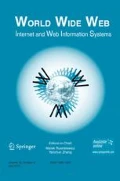Abstract
With the popularity of mobile computing and social media, various kinds of online event-based social network (EBSN) platforms, such as Meetup, Plancast and Whova, are gaining in prominence. A fundamental task of managing EBSN platforms is to recommend suitable social events to potential users according to the following three factors: spatial locations of events and users, attribute similarities between events and users, and friend relationships among users. However, none of the existing approaches considers all the aforementioned influential factors when they recommend users to proper events. Furthermore, the existing recommendation strategies neglect the bottleneck cases of the global recommendation. Thus, it is impossible for the existing recommendation solutions to be fair in real-world scenarios. In this paper, we first formally define the problem of bottleneck-aware social event arrangement (BSEA), which is proven to be NP-hard. To solve the BSEA problem approximately, we devise two greedy heuristic algorithms, Greedy and Random+Greedy, and a local-search-based optimization technique. In particular, the Greedy algorithm is more effective but less efficient than the Random+Greedy algorithm in most cases. Moreover, a variant of the BSEA problem, called the Extended BSEA problem, is studied, and the above solutions can be extended to address this variant easily. Finally, we conduct extensive experiments on real and synthetic datasets which verify the efficiency and effectiveness of our proposed algorithms.






Similar content being viewed by others
References
Armenatzoglou, N., Papadopoulos, S., Papadias, D.: A general framework for geo-social query processing. PVLDB 6(10), 913–924 (2008)
Burkard, R.E., Dell’Amico, M., Martello, S.: Assignment Problems, Revised Reprint (2009)
Cao, C.C., She, J., Tong, Y., Chen, L.: Whom to ask?: jury selection for decision making tasks on micro-blog services. PVLDB 5(11), 1495–1506 (2012)
Cao, C.C., Tong, Y., Chen, L., Jagadish, H.: Wisemarket: a new paradigm for managing wisdom of online social users. In: KDD, pp. 455–463 (2013)
Du, R., Yu, Z., Mei, T., Wang, Z., Wang, Z., Guo, B.: Predicting activity attendance in event-based social networks: Content, context and social influence. In: UbiComp, pp. 425–434 (2014)
Feng, K., Cong, G., Bhowmick, S.S., Ma, S.: In search of influential event organizers in online social networks. In: SIGMOD, pp. 63–74 (2014)
Garfinkel, R.S.: An improved algorithm for the bottleneck assignment problem. Oper. Res. 19(7), 1747–1751 (1971)
Garey, M.R., Johnson, D.S.: Computers and Intractability: A Guide to the Theory of NP-Completeness (1979)
Karanikolaou, S., Boutsis, I., Kalogeraki, V.: Understanding event attendance through analysis of human crowd behavior in social networks. In: DEBS, pp. 322–325 (2014)
Kempe, D., Kleinberg, J., Tardos, É: Maximizing the spread of influence through a social network. In: KDD, pp. 137–146 (2003)
Khrouf, H., Troncy, R.: Hybrid event recommendation using linked data and user diversity. In: RecSys, pp. 185–192 (2013)
Liu, S., Wang, S., Zhu, F., Zhang, J., Krishnan, R.: Hydra: Large-scale social identity linkage via heterogeneous behavior modeling. In: SIGMOD, pp. 51–62 (2014)
Liu, X., He, Q., Tian, Y., Lee, W.-C., McPherson, J., Han, J.: Event-based social networks: linking the online and offline social worlds. In: KDD, pp. 1032–1040 (2012)
Li, K., Lu, W., Bhagat, S., Lakshmanan, L.V., Yu, C.: On social event organization. In: KDD, pp. 1206–1215 (2014)
Lappas, T., Liu, K., Terzi, E.: Finding a team of experts in social networks. In: KDD, pp. 467–476 (2009)
Levandoski, J.J., Sarwat, M., Eldawy, A., Mokbel, M.F.: Lars: A location-aware recommender system. In: ICDE, pp. 450–461 (2012)
Liao, G., Zhao, Y., Xie, S., Yu, P. S.: An effective latent networks fusion based model for event recommendation in offline ephemeral social networks. In: CIKM, pp. 1655–1660 (2013)
Liu, X., Tian, Y., Ye, M., Lee, W.-C.: Exploring personal impact for group recommendation. In: CIKM, pp. 674–683 (2012)
Leong Hou, U., Yiu, M.L., Mouratidis, K., Mamoulis, N.: Capacity constrained assignment in spatial databases. In: SIGMOD, pp. 15–28 (2008)
Long, C., Wong, R.C.-W., Yu, P.S., Jiang, M.: On optimal worst-case matching. In: SIGMOD, pp. 845–856 (2013)
Minkov, E., Charrow, B., Ledlie, J., Teller, S., Jaakkola, T.: Collaborative future event recommendation. In: CIKM, pp. 819–828 (2010)
Mouratidis, K., Yiu, M. L., Mamoulis, N., et al.: Optimal matching between spatial datasets under capacity constraints. ACM Trans. Database Syst. (TODS) 35 (2), 9 (2010)
She, J., Tong, Y., Chen, L.: Utility-aware social event-participant planning. In: SIGMOD, pp. 1629–1643 (2015)
She, J., Tong, Y., Lei Chen, L., Cao, C.: Conflict-aware event-participant arrangement. In: ICDE, pp. 735–746 (2015)
Sun, Y., Huang, J., Chen, Y., Zhang, R., Du, X.: Location selection for utility maximization with capacity constraints. In: CIKM, pp. 2154–2158 (2012)
Tong, Y., Cao, C.C., Chen, L.: Tcs: efficient topic discovery over crowd-oriented service data. In: KDD, pp. 861–870 (2014)
Tong, Y., Meng, R., She, J.: On bottleneck-aware arrangement for event-based social networks. In: ICDEW, pp. 216–223 (2015)
Wong, R.C.-W., Tao, Y., Fu, A. W.-C., Xiao, X.: On efficient spatial matching. In: VLDB, pp. 579–590 (2007)
West, D.B.: Introduction to graph theory (2001)
Yin, H., Sun, Y., Cui, B., Hu, Z., Chen, L.: Lcars: A location-content-aware recommender system. In: KDD, pp. 221–229 (2013)
Yang, D.-N., Shen, C.-Y., Lee, W.-C., Chen, M.-S.: On socio-spatial group query for location-based social networks. In: KDD, pp. 949–957 (2012)
Zhang, W., Wang, J., Feng, W.: Combining latent factor model with location features for event-based group recommendation. In: KDD, pp. 910–918 (2013)
Acknowledgment
This work is supported in part by the Hong Kong RGC Project N _HKUST637/13, National Grand Fundamental Research 973 Program of China under Grant 2014CB340304, National Science Foundation of China (NSFC) under Grant No. 61502021, 61532004, 91118008 and 61232018, and Microsoft Research Asia Fellowship 2012.
Author information
Authors and Affiliations
Corresponding author
Electronic supplementary material
Below is the link to the electronic supplementary material.
Rights and permissions
About this article
Cite this article
Tong, Y., She, J. & Meng, R. Bottleneck-aware arrangement over event-based social networks: the max-min approach. World Wide Web 19, 1151–1177 (2016). https://doi.org/10.1007/s11280-015-0377-6
Received:
Revised:
Accepted:
Published:
Issue Date:
DOI: https://doi.org/10.1007/s11280-015-0377-6




